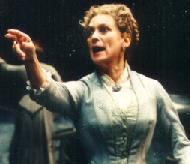SITE GUIDE
SEARCH
REVIEWS
REVIEW ARCHIVES
ADVERTISING AT CURTAINUP
FEATURES
NEWS
Etcetera and
Short Term Listings
LISTINGS
Broadway
Off-Broadway
NYC Restaurants
BOOKS and CDs
OTHER PLACES
Berkshires
London
California
New Jersey
DC
Philadelphia
Elsewhere
QUOTES
TKTS
PLAYWRIGHTS' ALBUMS
LETTERS TO EDITOR
FILM
LINKS
MISCELLANEOUS
Free Updates
Masthead
Writing for Us
A CurtainUp Review
Ghosts
| I picked a single knot and the whole fabric started to unravel -- Mrs. Alving |

Francesca Annis (Photo:John Haynes
|
The performances in this production are rather fine. Here we have a more likeable, less bitter than usual Mrs. Alving, played by the delightful Francesca Annis and Anthony Andrews' Pastor Manders as gullible as he is stiff and pompous. Martin Hutson is convincingly normal in the difficult role of the sickly Oswald whose self blame is gently removed by his mother as she explains that it was not his own but his father's behaviour that has caused his illness. I do not remember any previous Mrs Alving saying that her husband had no outlet in this small town for his passionate nature. There is obvious affection here between mother and son. Robin Soans is up to the wheedling, ingratiating, squirming Jakob Engstrand who twists the Parson round his little finger. It is Manders who is the real villain, a bully, a hypocrite, the man who sent the young Mrs Alving back "to do her duty" to her syphilitic husband. Forget Sebastian Flyte, (Andrews' role in Brideshead Revisited). Anthony Andrews has a great future playing villains! Sarah Tansey completes the cast as Regina, the ambitious maid who does not know that she is related to the Alvings. Her indignant scene at the end of the play is a nice switch from agreeable to "gloves off"" bitterness as she opens up the wounds of resentment.
The new translation by Richard Harris has contemporary moments which might grate for some: a few "Whatever!"s and Regina telling the family "Anyway you slice it . . ." but that apart, it is a very good production, acted in style. Robin Phillips' direction does not allow the play to slow to Nordic angst. Paul Farnsworth's steely grey set of glass panelled walls, furniture painted in Scandanavian blues allow us to conjure up the mists swirling off the fjord. Water pours down the glass as it rains incessantly but when the orphanage goes up in flames, in the glass red lighting reflects the fire. Oswald's famous final lines (Would these have been a pun on son in Norwegian?) "The sun, the sun" have natural sunlight streaming onto the stage as the light goes out in Oswald's mind.
For a review of a production that's part of a complete Ibsen series in New York, Go Here
| GHOSTS
Written by Henrik Ibsen in a new version by Richard Harris Directed by Robin Phillips Starring: Francesca Annis, Anthony Andrews With: Sarah Tansey, Robin Soans, Martin Hutson Design: Paul Farnsworth Lighting Design: John B Read Running time: Two hours with an interval Box Office: 020 7369 1731 Booking to 23rd June 2001 Reviewed by Lizzie Loveridge based on 5th April 2001 performance at the Comedy Theatre Panton Street London SW1 |



